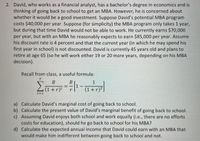
ENGR.ECONOMIC ANALYSIS
14th Edition
ISBN: 9780190931919
Author: NEWNAN
Publisher: Oxford University Press
expand_more
expand_more
format_list_bulleted
Question
Please show all work

Transcribed Image Text:2. David, who works as a financial analyst, has a bachelor's degree in economics and is
thinking of going back to school to get an MBA. However, he is concerned about
whether it would be a good investment. Suppose David's potential MBA program
costs $40,000 per year. Suppose (for simplicity) the MBA program only takes 1 year,
but during that time David would not be able to work. He currently earns $70,000
per year, but with an MBA he reasonably expects to earn $85,000 per year. Assume
his discount rate is 4 percent and that the current year (in which he may spend his
first year in school) is not discounted. David is currently 45 years old and plans to
retire at age 65 (so he will work either 19 or 20 more years, depending on his MBA
decision).
Recall from class, a useful formula:
T.
B
B
(1 +r)
(1 +r)".
t=1
a) Calculate David's marginal cost of going back to school.
b) Calculate the present value of David's marginal benefit of going back to school.
c) Assuming David enjoys both school and work equally (i.e., there are no efforts
costs for education), should he go back to school for his MBA?
d) Calculate the expected annual income that David could earn with an MBA that
would make him indifferent between going back to school and not.
Expert Solution
This question has been solved!
Explore an expertly crafted, step-by-step solution for a thorough understanding of key concepts.
Step by stepSolved in 2 steps

Knowledge Booster
Learn more about
Need a deep-dive on the concept behind this application? Look no further. Learn more about this topic, economics and related others by exploring similar questions and additional content below.Similar questions
- Sarah is unemployed if she is working at the accounting department of General Motor. is laid off and still looking for a job. has looked for a job for two months and then give up looking. is not looking for a job.arrow_forwardWhat role does a supervisor have in the staffing process?arrow_forwardIdentify each person with the appropriate classification Heather just finished college, is not working, but is looking for a teaching job. Luis worked at an auto plant. The plant shut down and Luis Gave up looking for a job 2 years ago. Robert has a nursing degree and is looking for a nursing job. He is sacking groceries part-time until he finds a job. Brittany is serving for 4 years in the Navy. Dan is a stay-at-home dad who is now looking for an engineering job? Bill is retired and volunteers at meal-on wheels every Monday Gina is attending college but not working : Labor Force- Employed : Labor Force- Unemployed :: Not in the Labor Forcearrow_forward
- Aviva's pay stub shows gross earnings of $349.05 for a week. Her regular rate of pay is $7.80 per hour for a 35-hour week and overtime is paid at time and one-half regular pay. How many hours did she work?arrow_forwardblanks C and D?arrow_forwardHow many days off does an oil rig worker get?arrow_forward
arrow_back_ios
arrow_forward_ios
Recommended textbooks for you

 Principles of Economics (12th Edition)EconomicsISBN:9780134078779Author:Karl E. Case, Ray C. Fair, Sharon E. OsterPublisher:PEARSON
Principles of Economics (12th Edition)EconomicsISBN:9780134078779Author:Karl E. Case, Ray C. Fair, Sharon E. OsterPublisher:PEARSON Engineering Economy (17th Edition)EconomicsISBN:9780134870069Author:William G. Sullivan, Elin M. Wicks, C. Patrick KoellingPublisher:PEARSON
Engineering Economy (17th Edition)EconomicsISBN:9780134870069Author:William G. Sullivan, Elin M. Wicks, C. Patrick KoellingPublisher:PEARSON Principles of Economics (MindTap Course List)EconomicsISBN:9781305585126Author:N. Gregory MankiwPublisher:Cengage Learning
Principles of Economics (MindTap Course List)EconomicsISBN:9781305585126Author:N. Gregory MankiwPublisher:Cengage Learning Managerial Economics: A Problem Solving ApproachEconomicsISBN:9781337106665Author:Luke M. Froeb, Brian T. McCann, Michael R. Ward, Mike ShorPublisher:Cengage Learning
Managerial Economics: A Problem Solving ApproachEconomicsISBN:9781337106665Author:Luke M. Froeb, Brian T. McCann, Michael R. Ward, Mike ShorPublisher:Cengage Learning Managerial Economics & Business Strategy (Mcgraw-...EconomicsISBN:9781259290619Author:Michael Baye, Jeff PrincePublisher:McGraw-Hill Education
Managerial Economics & Business Strategy (Mcgraw-...EconomicsISBN:9781259290619Author:Michael Baye, Jeff PrincePublisher:McGraw-Hill Education


Principles of Economics (12th Edition)
Economics
ISBN:9780134078779
Author:Karl E. Case, Ray C. Fair, Sharon E. Oster
Publisher:PEARSON

Engineering Economy (17th Edition)
Economics
ISBN:9780134870069
Author:William G. Sullivan, Elin M. Wicks, C. Patrick Koelling
Publisher:PEARSON

Principles of Economics (MindTap Course List)
Economics
ISBN:9781305585126
Author:N. Gregory Mankiw
Publisher:Cengage Learning

Managerial Economics: A Problem Solving Approach
Economics
ISBN:9781337106665
Author:Luke M. Froeb, Brian T. McCann, Michael R. Ward, Mike Shor
Publisher:Cengage Learning

Managerial Economics & Business Strategy (Mcgraw-...
Economics
ISBN:9781259290619
Author:Michael Baye, Jeff Prince
Publisher:McGraw-Hill Education